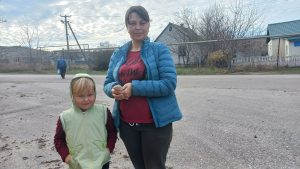This article by Kataryna Farbar was first posted by openDemocracy. Kataryna argues that Ukraine’s mobile postal service braves shelling to deliver packages and pensions. But privatisation could be afoot.
THIS VAN PROVIDES A LIFELINE SERVICE TO UKRAINIANS. COULD IT BE UNDER THREAT?
As soon as the Ukrposhta van stops in the centre of Kryva Luka, a dozen residents, mostly older people, gather round. They are here to collect money, pensions and parcels, and to buy some basic products.
Ukrposhta, Ukraine’s state postal service, has been operating this mobile post office system since 2020, two years before Russia’s full-scale invasion. Today, however, it is not just convenient: it is a lifeline for those living in areas where infrastructure has been destroyed.
Kryva Luka is one of these areas. It is 30 kilometres shy of Ukraine’s front line against Russia in the Donetsk region, close enough to face bombardment.
“I’m here to buy some sweets,” says pensioner Zinaida Shanyhon, 66. In the local village store, she adds, the goods she wants are up to twice as expensive as they are here. Like all elderly Ukrainians, she only has a small pension, so every hryvnia counts.
Shanyhon has remained in Kryva Luka, despite the risk posed by the nearby Russian-Ukrainian front line. For her, like many residents of villages like these, Ukrposhta is a sole point of contact with the Ukrainian state.
But there are fears that that core role could be at risk if Ukrposhta is privatised.
Over the summer, Ukrainian president Volodymyr Zelenskyi signed off on restarting the large-scale privatisation of state enterprises, originally a pre-war initiative, as the wartime government seeks to attract new revenue.
Ukrposhta is one of Ukraine’s biggest companies. Its 50,000 employees cater for the country’s businesses and their logistics – as well as residents of towns, cities and villages, where tens of thousands of people like Shanyhon live.
Like Ukraine’s much-vaunted state railway network, Ukrposhta serves a critical function for Ukrainian society – and is often one of the first state institutions to move into areas previously occupied by Russia.
Ukrposhta is not so far on the potential list of large companies slated for sale, but prior to Russia’s full-scale invasion a partial privatisation of Ukrposhta had been actively discussed, including by the company’s CEO Ihor Smilanskyi.
Instead of “defending [its] imaginary ‘national property and strategic assets’” Ukraine must “find another way to remain relevant and competitive in the world economy – with the involvement of partners who have either money, or technology, or both,” Smilanskyi wrote in 2019.
Speaking to openDemocracy, Ukrposhta said: “We do not rule out that we will return to the issue [of partial privatisation].” A spokesperson added the company was currently “focused not only on immediate duties, but also on supporting the country and confronting the enemy”.
Dangerous work
“People need us – that’s what we always focus on.”
Maria Synelnikova, 33, is head of the Lyman mobile post office. She spoke to openDemocracy as Kryva Luka residents holding their wallets flocked to the van.
Nataliya Pidhora, a younger resident of Kryva Luka, has come to pick up parcels of clothes she bought online. Pidhora, a cleaner in a local community centre, has a five-year-old daughter who was hoping to pick up a toy microphone from the postal van, but the postal worker forgot to bring the parcel. Driver Vodolymyr Krynykachanskyi apologises to the little girl and promises not to forget the parcel next time.

As critical infrastructure in remote areas, Ukrposhta is responsible for paying pensions and social benefits to Ukrainians, as well as the delivery of humanitarian aid.
But in areas like the villages outside Lyman – and closer to Bakhmut – that work is dangerous. A little over a month ago, the Russian military renewed assault operations in the Lyman-Kupiansk direction, a territory that the Ukrainian army liberated last year. In the worst affected parts of the wider Donetsk region, Ukrposhta employees drive armoured cars and wear bulletproof vests as they do their rounds of villages.
“The situation is rapidly changing. At the moment, the conditions are particularly uncomfortable due to the intensification of hostilities,” says Mykhailo Zuevskyi, Ukrposhta’s territorial manager in Donetsk.
Other settlements in the Donetsk region, like Siversk and Chasiv Yar, can also be unpredictable for Ukrposhta workers: a Russian rocket can strike here in a matter of seconds after being launched from the other side of the frontline.
Krynykachanskyi told openDemocracy he “was scared only once” in the three years he has worked as a driver. A month ago he experienced shelling in the village of Yampil during a particularly busy day where he was distributing payments of 6,000 hryvnias [around £133] from the UN.
“I was very scared,” says Krynykachanskyi, who carries a pack of cigarettes in his bulletproof vest – a protection that has become as normal as his uniform.
He remembers counting 23 explosions within half an hour, in a radius of a kilometre, very close to his postal van. Krynychanskyi says he and his two colleagues were forced to continue distributing payments and mail, hiding near a tree and a car during the shelling, because Yampil residents refused to disperse.
“People did not want to leave – they were afraid that we would not come again, even though we told them that we would come on the next day,” Krynykachanskyi recalls.
The day, after finishing in Kryvya Luka, the mobile post office headed to the village of Zakotne, 10 kilometres to the east, from where isolated explosions could be heard.
Back in the regional office in Slovyansk, Donetsk regional manager Zuevskyi received a message from Synelnikova in Lyman that she and her colleague had had to stop their work in Zakotne due to shelling. Simultaneously, Zuevskyi received a video from his workers in another mobile post office, serving Chasіv Yar, filmed while taking cover from shelling falling nearby.
‘No one else will go there’
In some cases, Ukrposhta, as the appointed national operator, has even continued serving Ukrainian citizens remotely in territories occupied by Russia.
Until August last year, Ukrposhta was giving out hundreds of thousands of pensions and taking utility bill payments to serve territories of Kherson and Zaporizhzhia that were not controlled by the Ukrainian state.
It is also the only service that works in cities ravaged by active fighting.
“Where stationary post offices near the front line were destroyed, they were closed. Instead, our mobile offices were used to serve these territories,” said Vadym Shestopalov, who headed the Donetsk regional office between February 2021 and July 2023 and is currently the operational director for the central region of Ukraine.

The Ukrposhta van on its rounds – Kateryna Farbar
“When the fighting was raging in the centre of the city of Severodonetsk, we were coming to the pensioners who at that time lived in a bomb shelter of the Azot plant to deliver their pensions.”
In Bakhmut, Ukrposhta’s mobile post offices worked until December last year, when the hostilities intensified, so that several thousand people staying there could receive payments.
Ukrposhta is a joint-stock company, entirely owned by Ukraine’s Ministry of Infrastructure. Though it receives no public funding, it has a statutory responsibility to provide the services described in this article – including those that might be seen as loss-making or too dangerous by a future private owner.
“We perform a social function,” said Maksym Sutkovyi, the current head of Ukrposhta’s Donetsk office. “In Chasiv Yar, where three pensioners live in one area, these are, of course, unprofitable deliveries.” He pointed to the cost of fuel and repairs as well as high workers’ wages.
But he knows that the work is vital. “No one, except for us, will go there – neither banks, nor other postal logistics operators,” he said.
Thomas Barrett, a PhD candidate at the Max Planck Institute for the Study of Societies in Cologne, echoed Sutkovyi’s words. “In many villages,” he said, “Ukrposhta might be the only point of access to the state and public services.”
Indeed, Ukrposhta’s competitor for parcel deliveries, the private company Nova Poshta, operates only in more peaceful parts of the frontline area.
Partial privatisation?
In 2019, Ukraine’s Cabinet of Ministers was considering the partial privatisation of Ukrposhta, with possible foreign investments between 20% and 30%. This, Ukrposhta hoped, would provide normal corporate management and additional funds for the development of the company, like renewal of the infrastructure, while maintaining its social function.
Though the plan was shelved, Zelenskyi’s restarting of the privatisation drive could put it back on the table in future.
Barrett believes that, if Ukrposhta is privatised, the provision of public or subsidised services through the postal system will be abandoned.
“This will lead to the closure of post offices in many villages across the country and create a host of problems for the most vulnerable to access goods and services. Private providers will only fill the gap in profitable areas,” he said.
23.11.23
__________
also see:
Ukraine Solidarity Campaign Scotland) and solidarity with GMB workers at Beith – USC(S)
Ukraine Rail Union (VPZU) backs ASLEF strike – Volodymyr Kozelskyi

